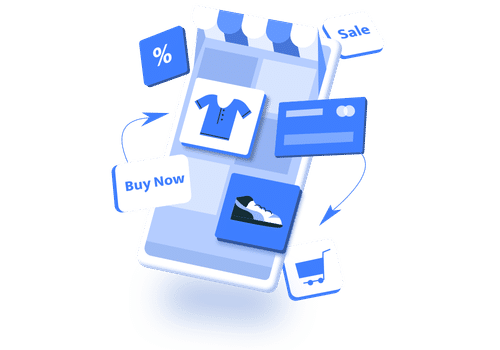8 Powerful (& Actionable) Ideas to Boost Your eCommerce Marketing Strategy
So you’ve recently set up a flashy eCommerce store. That’s terrific! However, to build brand awareness, drive traffic and ultimately boost sales, you are going to need a solid, comprehensive and effective eCommerce marketing strategy built around providing your customers the most seamless shopping experience possible.
Your primary goals are simple- customer acquisition and generation of more repeat purchases. And to achieve them, all you need are practical and actionable marketing ideas that ensure that your eCommerce marketing strategy cuts through the clutter.
Download Free: A/B Testing Guide
While there’s no set formula, there are a few eCommerce marketing tactics that should definitely make it to your hygiene checklist. Here are 8 of those impactful ideas for your eCommerce marketing strategy that can help you retain your customers, build thriving brand loyalty, and increase sales:
1. Optimize Your eCommerce Website and Mobile App for Better Conversions
Even with major players hogging the limelight, the eCommerce domain is vast and diverse. Competition is huge, and the average conversion rate is as low as 2-3%. Moreover, the cost of acquiring new visitors through pay-per-click, Facebook ads or search engines is also steadily rising. So, it is now all the more important for businesses like yours to make the most of incoming visitors and existing users through your eCommerce marketing strategy.
Conversion Rate Optimization (CRO) steps in here, helping you convert more visits into purchases. It is the constant process of improving different aspects of your website and mobile app that impact your users’ experience and decision-making. This will make sure that your visitors are more likely to checkout what’s in their carts. Websites and apps are constantly monitored to see at what point the customers are falling through the cracks and leaving. With the help of CRO platforms, you can continuously learn more about your users’ behavior and optimize your site and app to boost conversions.
2. Create Content That Offers a Personalized Shopping Experience
For your business to survive and thrive in this era, simply offering quality products isn’t enough. Your customers expect more. To ensure they come back to your online store, you need to offer them a personalized shopping experience centered around individualized deals and product recommendations.
To get started, try and get to know your customers better by checking the product pages that they visit, the type of content they consume, the device they use to shop, and so on. Once you comprehend these details, you can start building audience segments and give your users personalized shopping experience.
You can use tools such as VWO to understand user behavior on your website and target them accordingly.
Here’s a glimpse of how Sephora provides personalized communication and product recommendations on both their website and emails; based on user behavior.
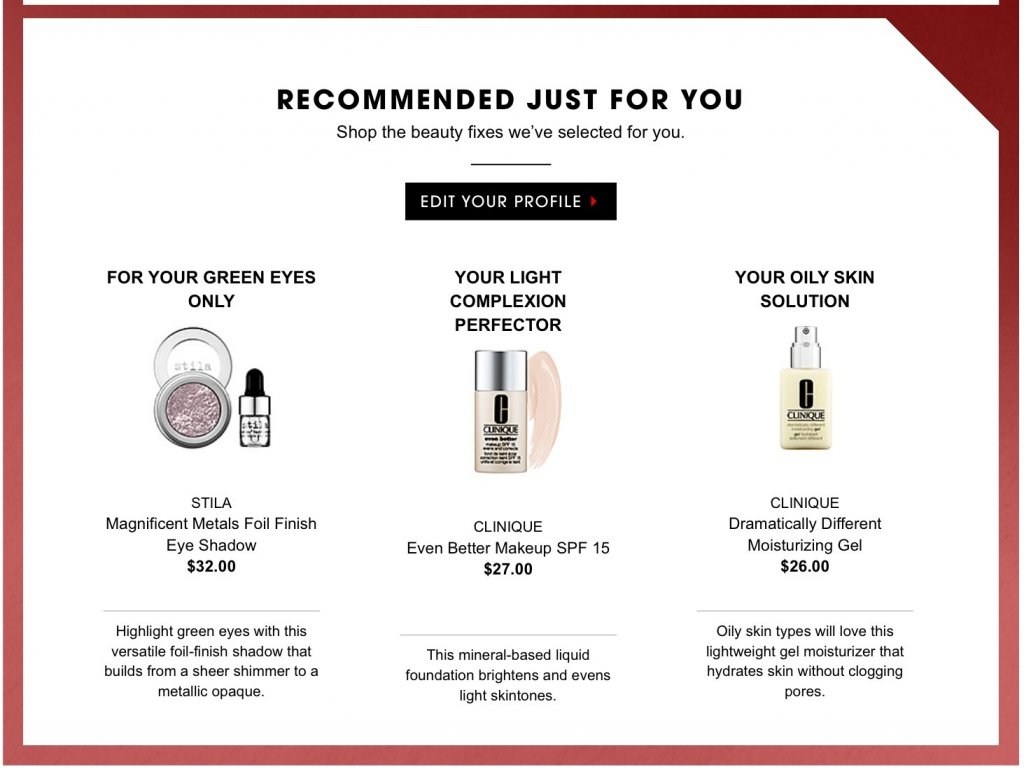
3. Use Targeted Push Notifications For People Who Have Visited Your Website
With web or browser push notifications, your customers need not install your mobile app to be notified of your offers or discounts. Unlike app push notifications, web push notifications work on desktop and mobile browsers. This medium of communication is a compelling one, power-packed with sharp features like scheduling and audience segmentation.
How do they work?
When a visitor comes to your website for the first time, an opt-in box appears, asking for permission to send them push notifications. When the visitor clicks ‘Allow’; they are added to your subscriber list.
How can web push notifications help your business?
Sending push notifications in your marketing campaign helps you engage with your customers (or potential customers) at different stages of their purchase journey and constantly keep in touch with them. The great part is, your users don’t have to share their email id or any other personal information while subscribing to your web push notifications, which makes opt-in incredibly hassle-free. Moreover, once they opt-in, you can connect with them whenever they’re online, they don’t necessarily have to be on your website to receive your push notifications.
Quick tip: Use tools such as VWO Engage to further segment your subscribers and send out targeted push notifications for better engagement.
Here are some interesting push notification ideas that you can steal for your eCommerce marketing strategy:
• New product announcements:
Tell your customers about newly added products/collections to your store.
For example, if you’re a clothing store and you’ve recently added a floral collection, you can send a notification to your customers that looks something like this:
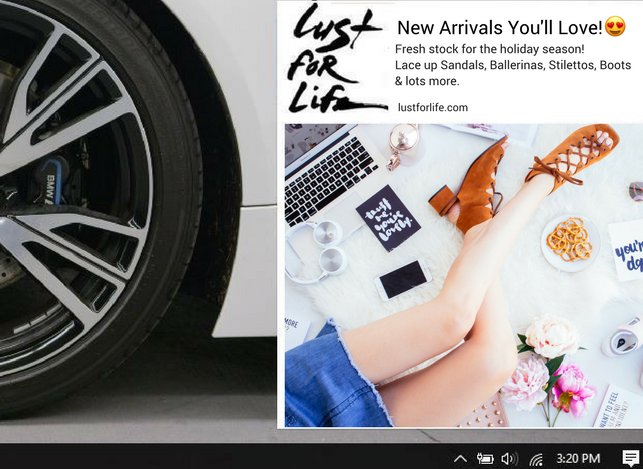
• Sale & discounts:
Prompt your customers whenever you run flash sales or discounts. This can also be personalized based on your customers’ last interaction or browsing behavior on your website.
For instance, if a user usually visits the ‘Home Decor’ section of your website, you can send them a personalized push notification which looks something like this:
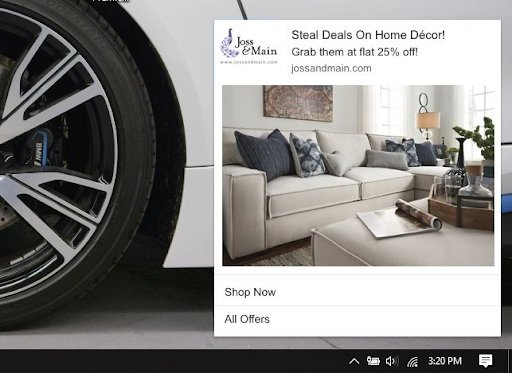
• Get more signups:
Not everybody who comes to your website would want to shop from you instantly. However, you can surely engage with them and nudge them ahead in the buyer’s funnel by sharing targeted and useful content.
Let’s say you’re a travel eCommerce company; you can send out notifications about new blog posts that you publish to get customers back to your website.
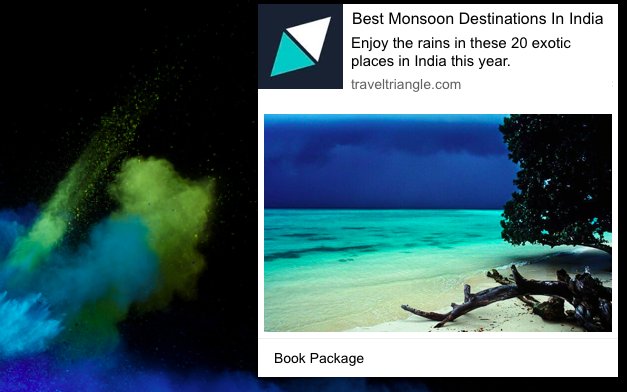
The key is to keep your push notifications exciting and contextual. If they check these two boxes, they will work wonders for your eCommerce business.
Download Free: A/B Testing Guide
4. Start Loyalty Programs & Provide Special Offers
If you haven’t already, it’s time to get to terms with the harsh reality that 80% of your business revenues come from 20% of your customers, which essentially are your repeat customers.
Loyalty programs are a great retention tool for your eCommerce marketing strategy to keep your customers coming back to your store and thereby convert them into loyal customers. There are several types of customer loyalty programs that you can use for your store, so narrowing down on one can get difficult.
To make things simpler, we’ve listed the top 3 loyalty programs that you can opt for along with examples of how you can use them to your brand’s advantage.
• Reward points programs:
The math here is simple: spend more to earn more!
Every time a customer makes a purchase from your eCommerce store, they earn reward points based on the size of their purchase.
It’s normally advised to keep the points system extremely easy for your customers to understand so that they can see what’s in it for them (the real value) right away without having to spend too much time calculating.
Shein.com runs a very interesting ‘SHEIN Bonus Point Program’.
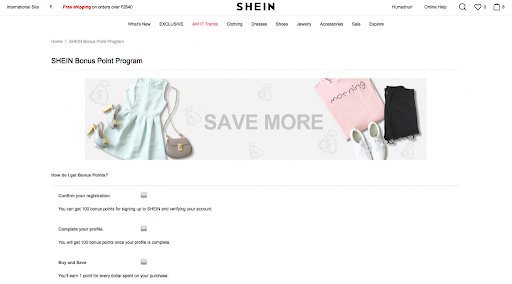
The SheIn Bonus Points Program has multiple activities listed down for customers to perform, and each activity is associated with bonus points ranging from 1-100.
Every 100 points=$1. Customers get to earn these bonus points once they fulfill these activities. For instance, as soon as a customer completes their registration, they earn 100 bonus points. They can then use their accumulated bonus points to pay for their purchases.
• VIP memberships
As the name suggests, in this program, your customers can buy a quarterly or annual subscription to join your VIP member club. You must give exclusive discounts and benefits to your VIP members to create brand stickiness and improve loyalty. Here’s an example from Amazon Prime.
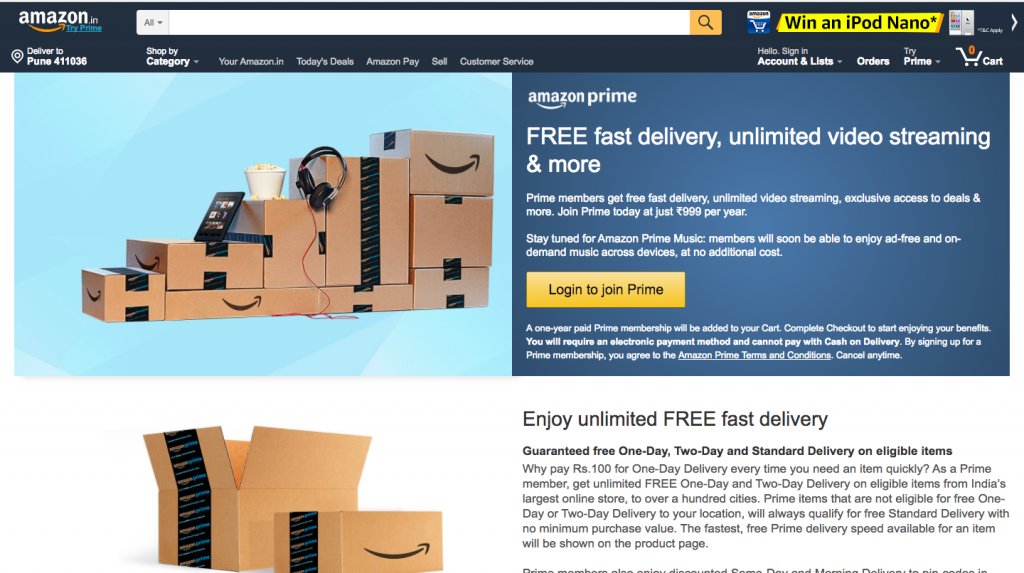
Amazon’s Prime membership has transformed customer loyalty and the way people look at eCommerce, forever. For just $99 per year, customers get access to fast, free shipping on thousands of products along with unlimited video streaming and exclusive early access to flash sales and deals.
• Gamification
By gamifying your loyalty program, you can boost sales and entertain your customers; keeping them hooked for more.
MasterCard’s Scan, Spin & Win program is a fairly straightforward example of how you can leverage gamification for your eCommerce marketing strategy to achieve your business goals.
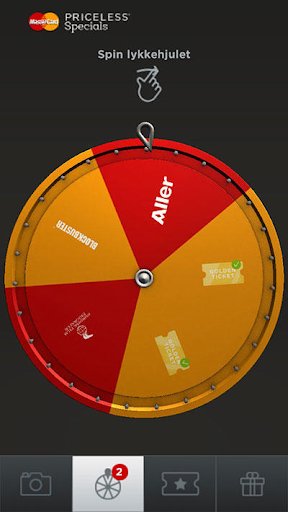
Every time a customer makes a purchase using their MasterCard, they can scan their receipt and spin the wheel to win exciting prizes. The giveaways range from discounts on movie tickets, free magazine subscriptions, travel gift vouchers, and lots more!
5. Redefine Customer Support
Providing exceptional customer support is critical for your eCommerce marketing strategy for both acquiring and retaining customers. In fact, stats suggest that a customer is 4 times more likely to switch to a competitor if customer support isn’t up to the mark.
Here’s how you can make an effort to keep your customers coming back to your store by providing efficient customer support:
- Keep an eye on social media: Whenever customers face an issue, they crave human interaction. Stats suggest that 88% customers refrain from buying from a brand that leaves complaints on social media unanswered. So, closely monitor every social media channel to ensure that no complaint/issue goes unresolved.
Pro tip: There are a bunch of free social media monitoring tools that you can use, such as HootSuite, BuzzSumo, and SproutSocial.
- Provide online chat support: While shopping, may it be online or offline, we all need a little help or have a quick question. With live chat, 8 out of 10 times you won’t have to follow up with a customer. According to Forrester research, “44% of online consumers say that having questions answered by a live agent while shopping on a website is one of the most important features a brand can offer.”
You can use tools such as Olark, Intercom, or Drift, which provide near-zero wait times and personalized responses to customer queries.
- Don’t make your customer wait: When your business has eager customers, as all growing businesses do, there will be an endless stream of questions, issues, complaints, queries, and compliments and when customers reach out to you, they expect you to address them immediately. Be prompt with your responses and try and resolve queries within 1-5 hours, from the time they’ve been raised.
Always remember, timely responses help build customer trust and loyalty, which in turn will improve customer retention for your business.
6. Surprise & Delight Your Customers
Walk that extra mile to make your customers feel special. Here are a few things you can do to surprise and delight your customers without having to break the bank:
- ‘Thank You’ note: You might feel that ‘Thank You’ notes have lost their charm considering that it’s such a tried and tested tactic. However, in this age of automation, a personalized, handwritten thank-you note can go a long way in telling your customer that you care.
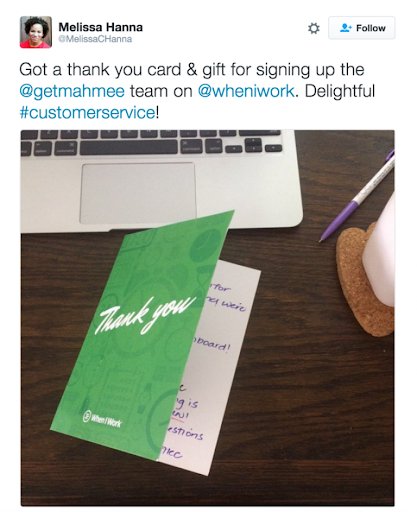
Pro tip: If you’re a small team and don’t really have people to write Thank You notes, you can always use tools such as Handwrytten or Thankyoubot.
- Free goodies and giveaways: A great way to delight your customers is by sending them free stuff. Make sure your gifts have your company’s logo and branding, which will build brand recall and also increase brand awareness when customers share gifts on social media. You can choose whom you want to send gifts to, it could be your newest customers or brand loyalists, you can set a milestone for which customer you’d like to send gifts to.
Here’s an example of EE– UK’s prominent internet service provider who sent a gift to one of their customers and how the customer proactively tweeted about it.
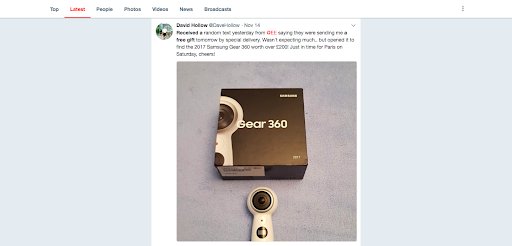
7. Make The Most of Social Media
Let’s face it. Your customers thrive in a world that revolves around social media. The good news is that this allows you to engage with your customers and be relevant in their lives. What’s more, social media enables you to receive direct feedback from your customers and provide them with instant support. And all these factors ultimately help you achieve your business goals.
In fact, it might interest you to know that brands that engage with customers via social media gain 20-40% more revenue per customer as opposed to brands that don’t.
One such social media marketing tactic that is slowly gaining traction (and could work wonders for your eCommerce marketing strategy) is Facebook and Instagram live videos- a great way for eCommerce companies to interact with their customers in real-time and reach wider audiences.
Case in point is Sephora’s AMA on Facebook Live, where they invite special guests to answer their customers’ questions and have discussions on beauty trends and products.

This attracts a large number of viewers who wouldn’t miss an opportunity to interact with world-class beauty experts. And it goes without saying that the brand makes it a point to integrate their products in almost every discussion point, thereby advertising themselves while answering their customers’ queries.
8. Nail The Art of Email Marketing
Since digitization, emails have long remained the primary channel of communication between a company and its users. It’s important that you don’t bombard subscribers with offers and discounts right away. Else, this will make you come across as too promotional.
With more eCommerce players joining the wagon, build a powerful content marketing strategy that helps you stand out by introducing your brand to the subscribers the right way. Tell your subscribers who you are and what your story is, while also telling them whom you sell your products to. Everyone loves to know where the brand comes from and how they fit into this brand’s’ story.
Huckberry has mastered the art of branding and marketing through emails. In the image below, they tell their brand story. This helps subscribers connect with the brand at a more human level.
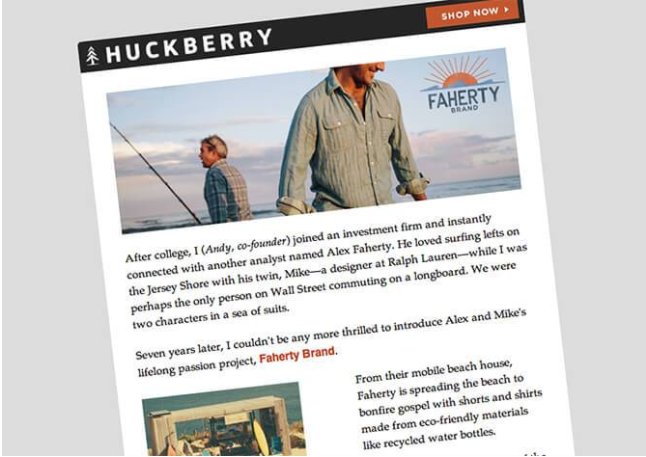
Pro tip: By making your emails content-intensive, you’re educating your email subscribers with information that they will love you for. For instance, if you happen to sell stylish clothes, provide content on the kind of accessories and hairstyles that go well with these garments for various occasions.
While none of the ideas listed above are a secret, including them in your eCommerce marketing strategy and implementing them effectively and efficiently will ensure that your brand is always on top of your customers’ minds.



